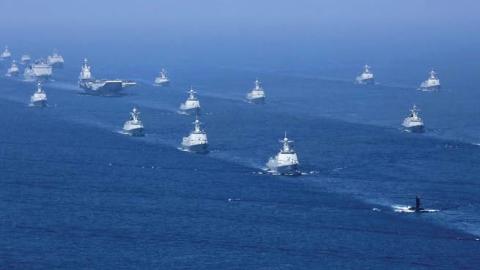The current chaos in Washington DC has given U.S. political discourse a distinct focus, a focus that will remain until 20 January, when Mr. Biden is inaugurated. Fortunately, the guardrails of democracy have held despite the stresses of the past year, particularly over the past three months. But Americans would do well to remember that administrations and presidents create and execute policy, rather than solely soothing disgruntled citizens.
The internal divisions that confront the American polity are most relevant when considered alongside international political trends. No relationship will be more defining in the 21st century than that between China and the United States. The self-styled People’s Republic remained guarded and coy throughout the late 20th century, began asserting itself in the 2000s, and since the mid-2010s has embarked upon a concerted campaign to expand its own influence, dominate the Asia-Pacific, and revise the international political order. It has used the COVID-19 pandemic to act without resistance, conducting its genocide against Muslims in East Turkestan, eliminating the last vestiges of Hong Kong’s parliamentary democracy, and isolating Taiwan diplomatically while probing it militarily.
PRC aggression calls for a concerted campaign to contain Chinese expansion, preserve the independence of Asia’s smaller polities, combat China’s support for authoritarianism and illiberalism, and ensure the preservation of a liberal, open, commercial international society.
Mr. Biden has recognized this. His foreign policy vision is based upon multilateral cooperation with the U.S.’ traditional partners, leveraging their combined strength to preserve their mutual interests primarily through diplomatic and economic measures. In this, he and his administration hope to return to the early-Cold War period, when the U.S. supported Western Europe economically against Soviet expansion and built an international alliance system that would contain communist expansion until the Soviet empire collapsed, as it did four decades later.
Economics is a central if often underappreciated component of statecraft. More so than military power, it can bind far-flung states into a coherent coalition based upon shared commercial and financial interest. Hence economic inducements are a critical diplomatic tool, effective as softer, more subtle "stick" than raw military pressure, while concurrently serving as a blatant "carrot," effective almost irrespective of regime type.
Moreover, the United States can only meet the next decade's challenges by working with, and standing alongside, its allies. China is too powerful and aggressive for America to stand alone. In the long-term, the U.S. must deny China its long-term political goals, which entail economic dominance in Africa and Central Asia, European trade-dependency, and a political free hand in the Western pacific. China’s global ambitions, along with its tacit partnership with Russia and potential future links with Iran and Cuba, necessitate a global coalition that integrates the U.S.’ European, Asian, Latin American, and Near Eastern allies.
However, the incoming administration must be cautious. China’s goals are neither purely economic nor diplomatic, although achieving them requires economic and diplomatic tools. The CCP has a strategic objective, one that in some way requires the use of force, much like its Soviet predecessor. This was a point of confusion throughout the Cold War. Soviet leaders possibly believed that the communist system ultimately would destroy capitalism and extend across the world.
But the Soviets’ first and critical order of business was transforming the European balance – it could not allow the United States, another non-European actor, to serve as Western Europe’s security guarantor. The Soviet Union spent decades patiently accumulating strategic assets. By the mid-1970s, the Soviets had cultivated a variety of allies and proxies in strategically critical locations. Cuba, Nicaragua, Angola, Somalia, South Yemen, Vietnam, Libya, and Syria were all located on major maritime lanes.
Having bided its time for decades, the USSR had finally assembled the pieces needed to consider moving against the United States and NATO. Soviet allies and submarines would pressure the U.S.’ global sea control, forcing it to divert maritime and aerial forces from the European central front. Every hour the U.S. spent regaining control of the South Atlantic, Eastern Mediterranean, and southern and western Pacific was additional time for the Soviets to drive to the River Rhine. Nuclear exchanges were expected, but Soviet Russia’s Eastern European satellites would absorb much of the damage. In the event, it took three major American policy shifts – a strategic partnership with China that pressured the Soviet south, a realignment with Israel and Egypt that challenged its aggression in the Mediterranean, and a massive military buildup in the 1980s – to deter a Soviet attack.
Similarly, while China’s eventual aim is global dominance, its current objective is gaining Indo-Pacific hegemony. Doing so requires, first, absorbing Taiwan, then humbling Japan, South Korea, Australia, Vietnam, and India, and finally barring America from exercising power further west than Hawaii. It is unlikely that these goals can be accomplished without force. Moreover, China’s leaders are not comfortable with pure economic expansion, as the CCP’s policy shift since the early-2000s has demonstrated. It is likely that they fear both preemptive U.S. containment measures and domestic unrest, doubt the Chinese system's ability to grow without colonial predation and feel China's honor demands that it be recognized as a great power and given its political due.
Diplomatic-economic resistance seldom deters states willing to use military force. Sanctions, asset freezes, even a blockade can cause immense economic damage and undermine social stability. But it takes months to years for their effects to be felt, diminishing the psychological deterrent value they offer when compared to the immediate gain of territorial conquest. Even more concerning is the paradox of hardened positions. As conflict escalates and damage increases, adversary political leaders and populations may become more willing to suffer to achieve their objectives than they were before a confrontation.
British policy before the Great War is a prime example of the difficulties of economic deterrence. The Royal Navy’s capacity to conduct a long-term blockade of Germany, it was thought, would be a more effective threat than, say, making great enough continental military commitment to deny Germany the gains of a first strike. When war came in 1914, however, German leaders dismissed the British threat and nearly succeeded in performing Count Schlieffen’s massive envelopment. Escalating savagery, first at Ypres, then Verdun and the Somme, catapulted the Hindenburg-Ludendorff dictatorship to power just weeks after the Royal Navy had demonstrated its ability to maintain a blockade indefinitely.
Economic apocalypse prompted escalation, not negotiation. Ironically, a similar set of assumptions guided British policy during the 1930s. Not only, the “appeasers” argued, was Hitler simply asserting his justified rights, but he was nowhere near insane enough to unleash upon Germany the economic destruction a European war would cause.
The Biden administration's emphasis on multilateralism in dealing with China should be welcomed. America must stand but cannot stand alone. Nevertheless, this nation must take care. Today, as in any other era, blood remains the price of power and military force its most valuable currency. America's adversaries understand this fact. Not recognizing it, therefore, is an invitation to violence. Forming a broad-based multilateral coalition to counter Beijing’s economic/diplomatic expansion should not curtail the U.S. military’s need to equal and surpass China’s continuing arms buildup.
Read in RealClear Defense
















